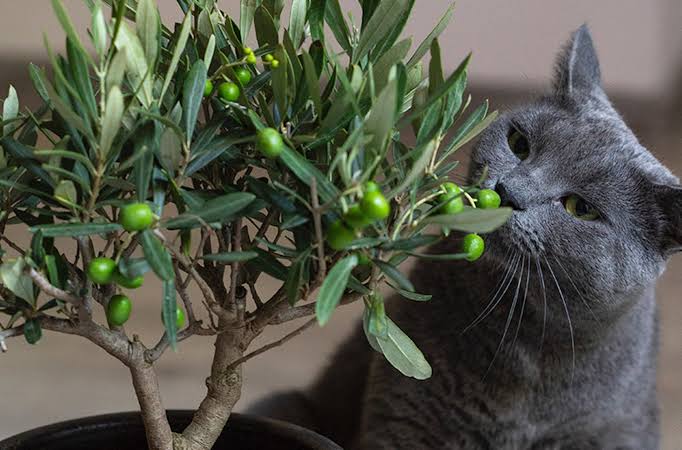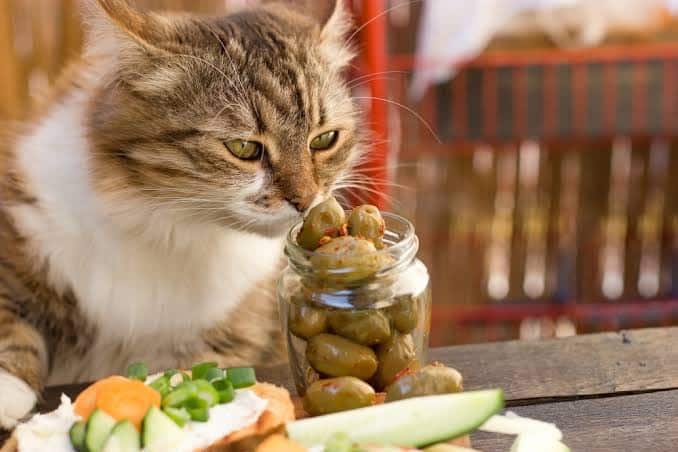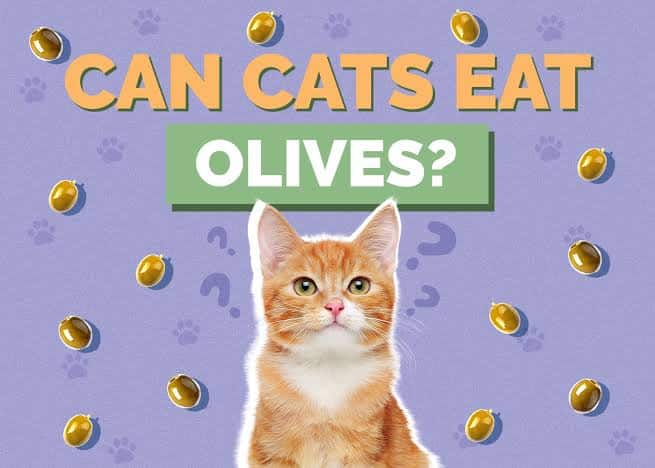From the ordinary to the unexpected, pet owners are constantly seeking clarity to ensure their furry companions stay happy and healthy. One such query that frequently arises is “Can Cats Eat Olives?”. Therefore, we ask, are you ready to discover the answer?.
Why Some Human Foods May Not Be Suitable For Cats?
While cats may beg for a taste of our human food, not everything that’s safe for us is safe for them. Understanding why certain human foods may not be suitable for cats is crucial for their health and well-being.
Dietary Differences
Cat bodies are designed to thrive on a diet rich in animal proteins, fats, and minimal carbohydrates. Human foods, on the other hand, often contain ingredients that can be harmful or difficult for cats to digest.
Toxic Ingredients
Many common human foods contain ingredients that are toxic to cats. For example, onions, garlic, and chives, which are often used to season human dishes, can cause gastrointestinal upset, anemia, or even organ damage in cats. Chocolate, grapes, raisins, and certain nuts are also toxic to cats and can lead to severe health issues if ingested.
Digestive Sensitivities
Cats have sensitive digestive systems, and certain foods can trigger gastrointestinal issues such as vomiting, diarrhea, or constipation. Foods high in fat, spices, or artificial additives can be particularly problematic for cats and may lead to digestive upset or pancreatitis.
Nutritional Imbalance
Feeding cats a diet primarily composed of human foods can lead to nutritional imbalances. While some human foods may provide certain nutrients, they often lack essential vitamins, minerals, and amino acids that cats need for optimal health. This can result in deficiencies over time, affecting their overall well-being and longevity.
Weight Management
Human foods are often higher in calories and fat than what cats require. Feeding cats excessive amounts of fatty or calorie-dense foods can contribute to weight gain and obesity, which are significant health concerns in cats. Maintaining a healthy weight is essential for preventing obesity-related health issues such as diabetes, arthritis, and heart disease.
Allergies And Intolerances
Dairy products, for example, are a common allergen for cats, causing gastrointestinal discomfort or skin issues. Other ingredients like gluten or soy may also trigger allergic reactions in some cats, leading to itching, digestive upset, or skin problems.
Behavioral Issues
Feeding cats human foods can also lead to behavioral issues such as begging, food aggression, or selective eating. When cats become accustomed to receiving table scraps or treats from their owners, they may become picky eaters or refuse to eat their regular cat food. This can disrupt their nutritional intake and lead to further health problems down the line.
Recommended: Can Cats Eat Apples?

Nutritional Profile And Health Benefits Of Olives
Olives, often enjoyed as a delicious snack or flavorful addition to various dishes, offer more than just their distinctive taste. These small fruits are packed with nutrients and boast an array of health benefits.
Nutritional Profile:
Olives are rich in several essential nutrients, making them a nutritious addition to your meals. Here’s a breakdown of the key nutrients found in olives:
Healthy Fats
Olives are predominantly composed of healthy monounsaturated fats, particularly oleic acid, which is beneficial for heart health.
Antioxidants
Olives are abundant in antioxidants, including vitamin E and various phytonutrients like oleuropein and hydroxytyrosol.
Vitamins And Minerals
Olives are a good source of vitamins and minerals, including vitamin A, vitamin K, calcium, iron, and potassium. These nutrients play vital roles in maintaining bone health, supporting immune function, and regulating blood pressure.
Fiber
Olives contain dietary fiber, which aids in digestion, promotes satiety, and helps regulate blood sugar levels. A diet rich in fiber is associated with a reduced risk of obesity, diabetes, and digestive disorders.
Health Benefits:
In addition to their impressive nutritional profile, olives offer a multitude of health benefits:
Heart Health
The monounsaturated fats and antioxidants found in olives have been linked to a reduced risk of heart disease. Regular consumption of olives may help lower blood pressure, improve cholesterol levels, and decrease inflammation in the body, all of which contribute to a healthier heart.
Cancer Prevention
The antioxidants present in olives have protective effects against certain types of cancer, including breast, colon, and stomach cancers. These antioxidants help neutralize free radicals and inhibit the growth of cancer cells, reducing the risk of cancer development.
Anti-inflammatory Properties
Olives contain compounds with anti-inflammatory properties, such as oleocanthal, which has been likened to the effects of ibuprofen. Consuming olives regularly may help reduce inflammation in the body, alleviating symptoms of inflammatory conditions like arthritis and promoting overall joint health.
Improved Digestive Health
The fiber content in olives supports digestive health by promoting regular bowel movements and preventing constipation. Additionally, the presence of probiotics in some varieties of olives may contribute to a healthy gut microbiome, enhancing digestion and nutrient absorption.
Brain Health
The monounsaturated fats in olives are beneficial for brain health and cognitive function. Studies suggest that a diet rich in these healthy fats may help reduce the risk of cognitive decline and neurodegenerative diseases such as Alzheimer’s.
Can Cats Eat Olives?
While olives themselves aren’t toxic to cats, it’s essential to approach their consumption with caution.
Nutritional Value
Olives contain healthy fats and antioxidants, which offer potential health benefits for humans. However, cats have different nutritional requirements, and their bodies are designed to thrive on a diet rich in animal proteins. While olives aren’t harmful in small amounts, they don’t provide significant nutritional value for cats.
Digestive Sensitivity
Cats have sensitive digestive systems, and introducing new foods can sometimes lead to gastrointestinal upset. Olives are high in fat, which may be difficult for some cats to digest, potentially causing vomiting, diarrhea, or discomfort.
Sodium Content
Olives are often brined or cured, leading to a high sodium content. Excessive sodium intake can be harmful to cats, as it may lead to dehydration, electrolyte imbalances, and kidney issues. It’s crucial to monitor the amount of salt in the olives before offering them to your cat.
Pits And Seeds
The pits or seeds found in olives pose a choking hazard for cats and can also cause intestinal blockages if ingested. Ensure that olives are pitted and sliced into small, manageable pieces before feeding them to your cat.
Recommended: Can Cats Eat Coconut?

Factors To Consider When Introducing Olives To A Cat’s Diet
If you’re considering offering olives to your cat as an occasional treat, here are some factors to keep in mind:
Moderation
Offer olives to your cat in moderation and as an occasional treat rather than a regular part of their diet. Limit the portion size to avoid overfeeding and potential digestive issues.
Preparation
Ensure that the olives are pitted and sliced into small pieces to prevent choking hazards. Opt for plain olives without added seasonings or brine, as these may contain ingredients that are harmful to cats.
Observation
Monitor your cat’s reaction after consuming olives. If your cat exhibits any adverse symptoms, refrain from offering olives in the future.
Consultation
If you’re unsure about whether olives are suitable for your cat or if your cat has specific dietary concerns or health issues, consult with your veterinarian before introducing olives to their diet. Your vet can provide personalized guidance based on your cat’s individual needs.
Steps To Take When Your Cat Eats Olives
Discovering that your cat has ingested something unexpected can be concerning, especially when it comes to human foods like olives. While olives themselves aren’t toxic to cats, there are certain steps you should take if your feline friend has consumed them. Here’s what to do if your cat eats olives:
1. Assess The Situation:
Start by assessing the situation and determining how much of the olive your cat has eaten. Consider whether the olives were plain or seasoned, as certain ingredients like garlic or onions can be harmful to cats.
2. Monitor Your Cat
Keep a close eye on your cat for any signs of gastrointestinal upset or discomfort. If your cat exhibits any concerning symptoms, contact your veterinarian for guidance.
3. Check For Pit Or Seed Ingestion
If the olives contained pits or seeds, check to see if your cat has ingested them. Pits and seeds can pose a choking hazard and may cause intestinal blockages if swallowed. If you suspect that your cat has consumed pits or seeds, contact your vet immediately for advice.
4. Offer Water
Provide your cat with access to fresh water to help flush out any potential toxins or alleviate digestive discomfort. Hydration is essential, especially if your cat has consumed salty olives, which can lead to dehydration.
5. Consult Your Veterinarian
If you’re unsure about whether the olives your cat ate pose a risk or if your cat is exhibiting any concerning symptoms, don’t hesitate to contact your veterinarian. Your vet can provide personalized advice based on your cat’s individual health and circumstances.
6. Follow Veterinary Recommendations
Follow any recommendations provided by your veterinarian, which may include monitoring your cat at home, bringing them in for a check-up, or administering any necessary treatments. Your vet may also advise you on dietary adjustments or potential precautions to prevent future incidents.
7. Prevent Future Incidents
Take precautions to prevent your cat from accessing human foods like olives in the future. Store food securely and keep countertops clear of potential hazards. Educate family members and guests about the importance of keeping human foods away from pets.
8. Stick To A Balanced Diet
Ensure that your cat’s regular diet consists of balanced and nutritionally complete cat food tailored to their specific dietary needs. While occasional treats like plain, unsalted olives may be safe in moderation, they should not replace your cat’s primary diet.
Recommended: Can Cats Eat Raspberries?
Safe Alternatives To Olives For Cats
While olives may not be the ideal treat for your cat due to their high sodium content and potential digestive issues, there are plenty of safe and tasty alternatives that you can offer to your furry friend. Providing your cat with nutritious and cat-friendly treats is a great way to show them love and keep them happy and healthy. Here are some safe alternatives to olives for cats:
1. Cooked Meat
Cooked chicken, turkey, or lean beef are excellent options for cat treats. Make sure the meat is plain, without any seasoning or marinades, and cut it into small, bite-sized pieces for easy consumption. Meat is a natural source of protein that cats love and is easy for them to digest.
2. Fish
Cats are known for their love of fish, and offering small amounts of cooked fish like salmon or tuna can be a delightful treat. Just be sure to remove any bones and avoid feeding your cat raw fish, as it may contain parasites or bacteria that could make them sick.
3. Catnip
It contains a compound called nepetalactone, which produces a temporary euphoric response in cats when they smell or consume it. You can offer dried catnip leaves or catnip-infused toys for your cat to enjoy.
4. Freeze-Dried Meat Treats
Freeze-dried meat treats are another popular option for cats. These treats are made from real meat that has been freeze-dried to preserve its flavor and nutrients. They come in a variety of flavors, including chicken, fish, and beef, and are often free from additives or fillers.
5. Cooked Eggs
Cooked eggs are a nutritious and protein-rich treat for cats. Offer your cat scrambled eggs or hard-boiled eggs in small portions as an occasional treat. Eggs are also a good source of essential vitamins and minerals like vitamin A and omega-3 fatty acids.
6. Cat Treats
There are many commercially available cat treats specifically formulated for feline palates and nutritional needs. Look for treats made from high-quality ingredients, with minimal additives or fillers. Choose treats that are low in calories and designed to promote dental health or address specific dietary concerns.
7. Fresh Fruits And Vegetables
Some cats enjoy nibbling on fruits and vegetables like cooked pumpkin, steamed green beans, or slices of apple or banana. Offer these treats in small amounts and monitor your cat’s response. Not all cats will enjoy fruits and vegetables, so it’s essential to observe your cat’s preferences.
8. Homemade Treats
If you enjoy cooking, consider making homemade cat treats using cat-friendly ingredients like canned tuna, pureed chicken, or baby food. There are plenty of recipes available online for cat treats that are simple to prepare and free from harmful ingredients.
Conclusion
While olives may be a delicious and nutritious snack for humans, they are not recommended for cats. Despite their potential health benefits for us, olives can pose risks to our feline companions due to their high salt and fat content, as well as the presence of pits.
It’s crucial to prioritize your cat’s well-being by sticking to a diet specifically formulated for their nutritional needs. If your cat ever ingests olives or any other unfamiliar food, closely monitor them for any signs of discomfort or illness, and don’t hesitate to seek guidance from your veterinarian.
Remember, keeping your cat healthy and happy starts with making informed decisions about their diet and lifestyle.

